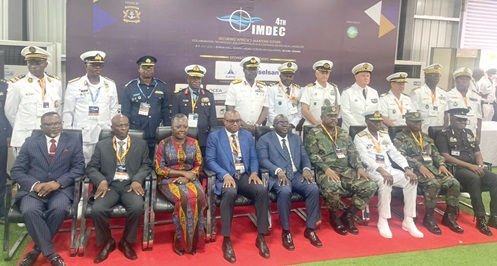Africa must act now to safeguard coastal waters
Africa must act now to safeguard coastal waters — Chief of Staff

Africa’s maritime future hangs in the balance unless urgent, coordinated and technology-driven action is taken to combat the growing threats along the continent’s coastal waters, the Chief of Staff, Julius Debrah, has said.
He said maritime security was no longer a regional concern but a continental imperative requiring investment in surveillance technology, intelligence sharing, environmental protection and unified political will.
“Our coastal waters are facing significant risks—from piracy and illegal fishing to drug trafficking and geopolitical tensions.
“We cannot afford to look unconcerned. Technology must be at the centre of our response if we are to outpace those who threaten our maritime security,” Mr Debrah added.
He was speaking at the opening of this year’s International Maritime Defence Exhibition and Conference (IMDEC) in Accra.
The event, which is being hosted by the Ghana Armed Forces, has participants such as international defence equipment manufacturers, technology providers, procurement officials and other maritime security stakeholders.
The two-day exhibition and conference aims to strengthen international and regional cooperation to combat terrorism and transnational organised crime across Africa waters.
Collaboration
Mr Debrah stressed that the threats to Africa’s maritime domain were both persistent and evolving, and, therefore, urged African leaders, the Navy and partners to embrace collaboration and innovation as a matter of survival.
He called for investment in modern surveillance systems, cybersecurity infrastructure, intelligence sharing and autonomous capabilities to stay ahead of transnational threats.
The Chief of Staff also said that maritime security must go hand-in-hand with environmental and economic sustainability, describing marine protection and climate adaptation as essential for the continent’s survival.
He emphasised the need for Africa to speak with a unified voice in defending its maritime interests amid shifting global alliances and increasing great-power competition.
Mr Debrah said Ghana remained committed to regional cooperation and would continue to support multilateral frameworks such as ECOWAS and the US Africa Command (AFRICOM).
Challenges
The Chief of Naval Staff, Rear Admiral Godwin Livinus Bessing, said while Africa’s maritime domain held massive potential for trade and economic growth, it remained vulnerable to piracy, armed robbery, illegal fishing and marine pollution.
He cited recent attacks in the Gulf of Guinea and a kidnapping incident involving a Ghanaian fishing vessel off the coast of Accra as reminders that maritime threats remained real, dynamic and transboundary.
“These incidents call for renewed vigilance and unified maritime defence strategies,” Rear Admiral Bessing said.
He acknowledged progress made so far through regional collaboration, improved naval capabilities, and initiatives like the Yaoundé Architecture and the Combined Maritime Task Force, but said “we must move from commitment to implementation”.
Partnership
The Minister of Fisheries and Aquaculture Development, Emelia Arthur, also called for stronger partnership between maritime defence and fisheries governance to protect the country’s blue economy and safeguard livelihoods of coastal communities.
She said illegal, unreported and unregulated (IUU) fishing continued to undermine artisanal livelihoods and national food security.
To address this, the minister said her outfit had adopted modern surveillance tools, including vessel monitoring and automatic identification systems, electronic catch documentation and satellite tracking.
“We need more patrol vessels. Piracy is re-emerging because we are not policing our waters enough,” she said.



